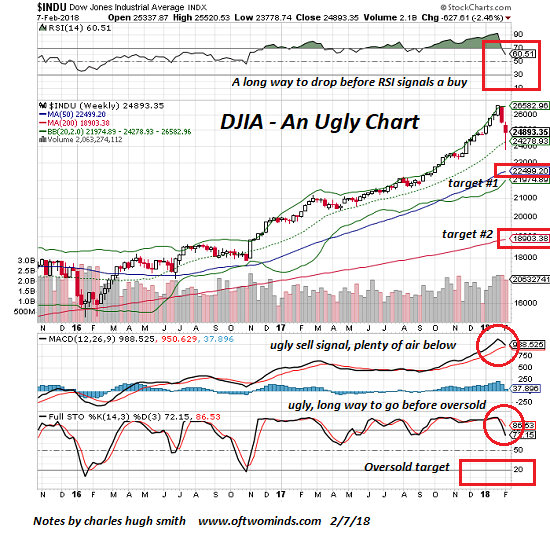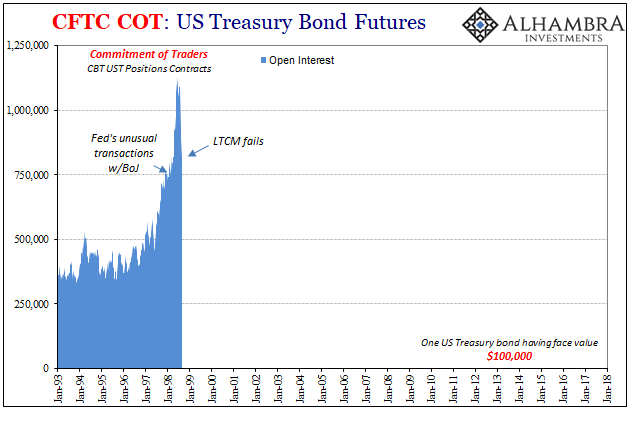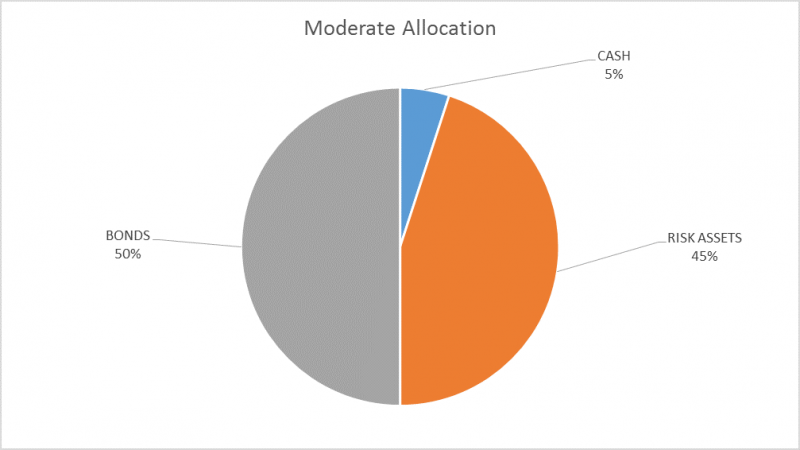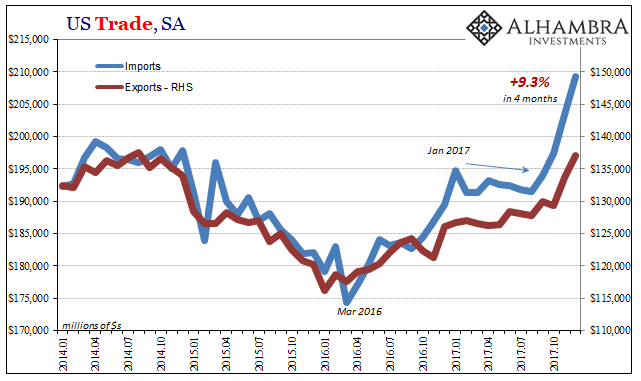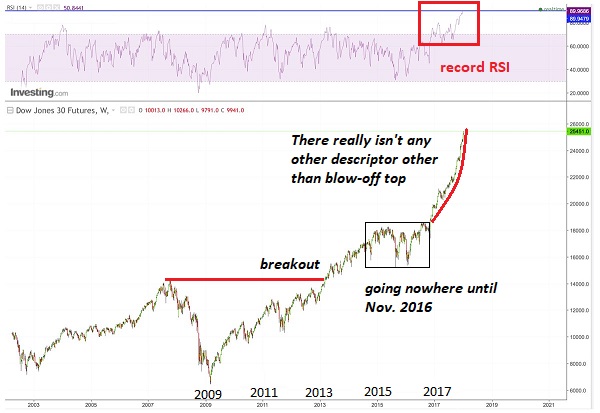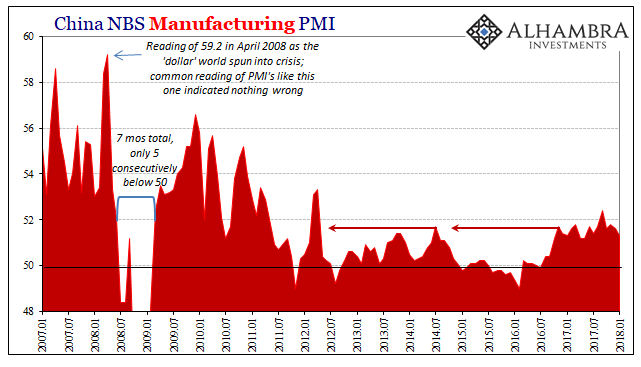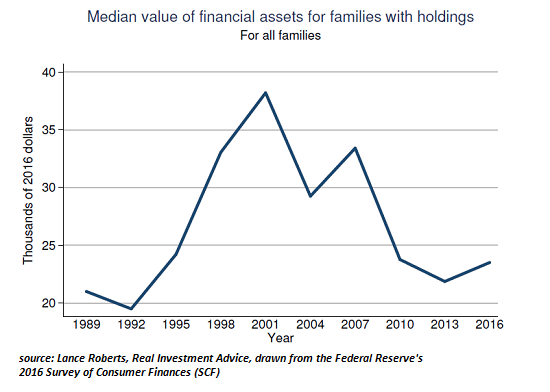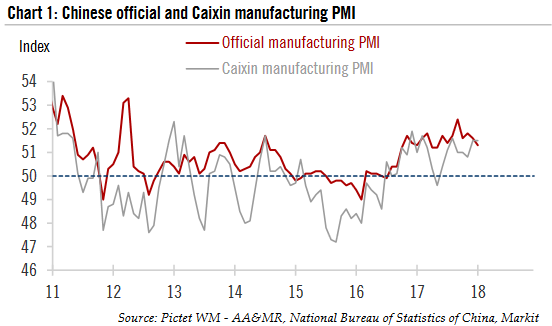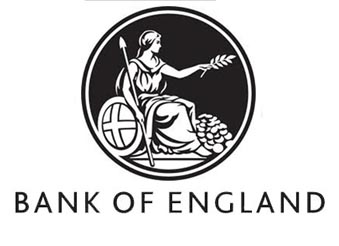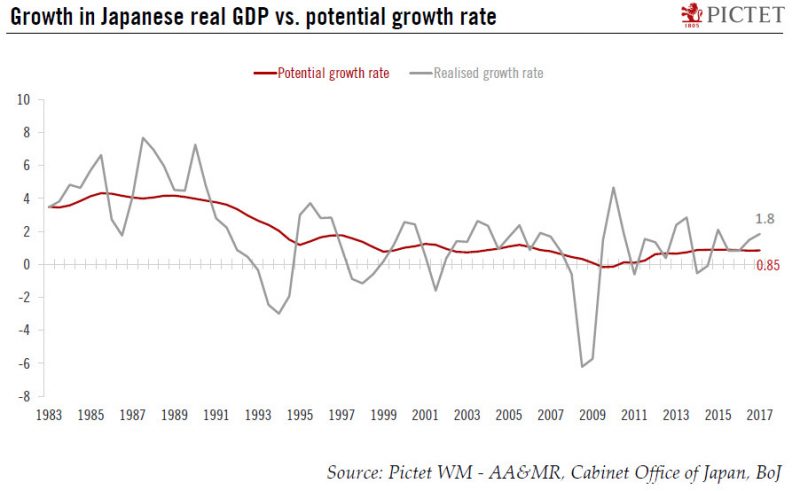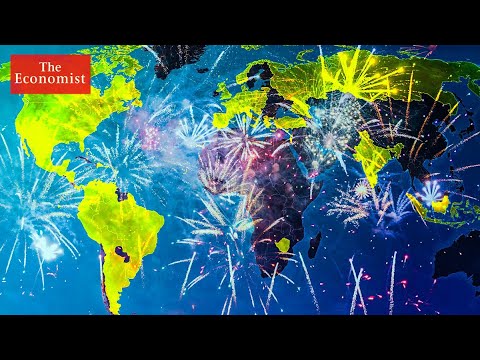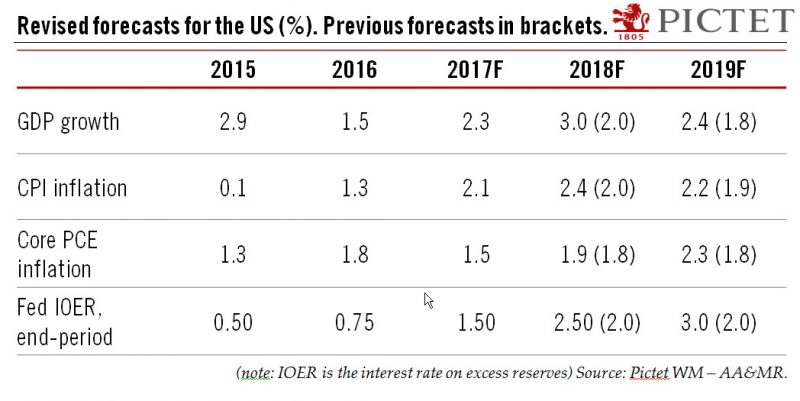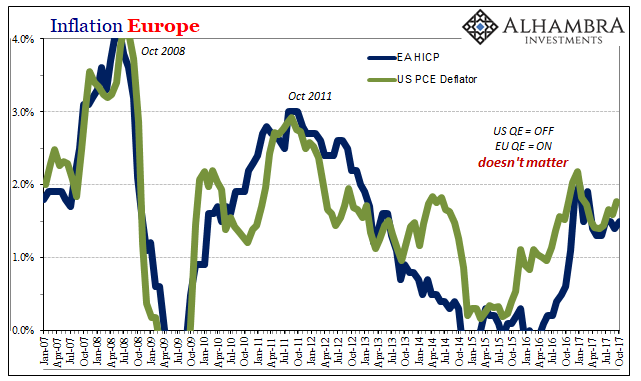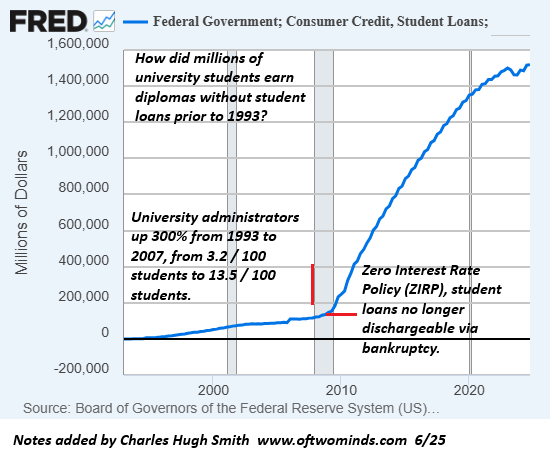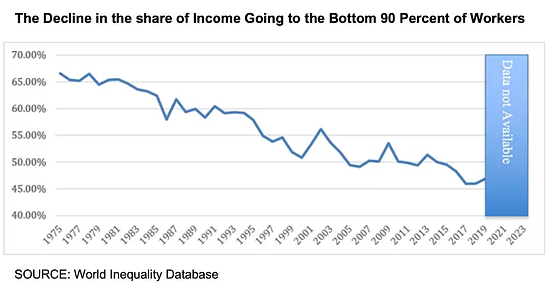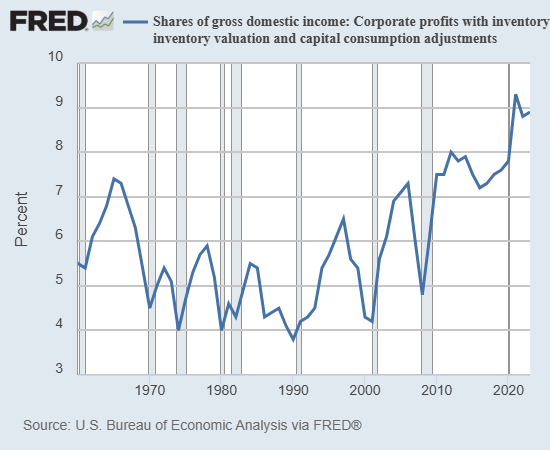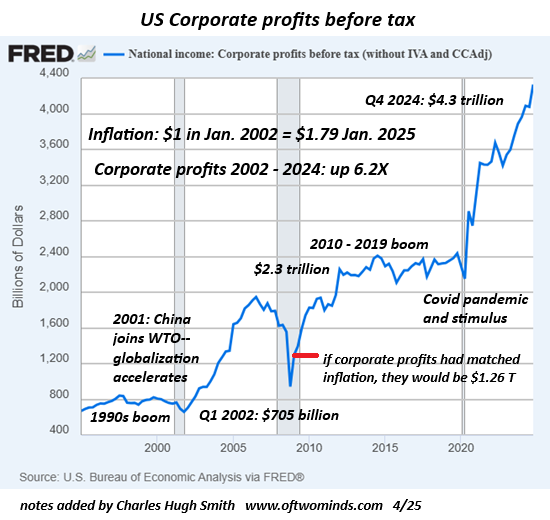Category Archive: 5) Global Macro

Emerging Markets: What has Changed
Reuters reported that China may loosen controls on outbound capital flows (QDLP). Samsung chief Lee was set free in an unexpected court reversal. Romania central bank hiked rates by 25 bp and raised its inflation forecasts for the next two years. South Africa President Zuma appears to be on the way out. Ecuador voters approved a referendum that reinstates term limits for the president. Venezuela central bank restarted FX auctions for the first time...
Read More »
Read More »
Before You “Buy the Dip,” Look at This One Chart
There's a place for fancy technical interpretations, but sometimes a basic chart tells us quite a lot. Here is a basic chart of the Dow Jones Industrial Average, the DJIA. It displays basic information: price candlesticks, volume, the 50-week and 200-week moving averages, RSI (relative strength), MACD (moving average convergence-divergence), stochastics and the MACD histogram. These kinds of charts are free (in this case, from StockCharts.com).
Read More »
Read More »
COT Blue: Interest In Open Interest
For me, the defining characteristic of the late nineties wasn’t the dot-coms. Most people were exposed to the NASDAQ because, frankly, at the time there was no getting away from it. It had seeped into everything, transforming from a financial niche bleeding eventually into the entire worldwide culture. We all remember the grocery clerks who became day traders.
Read More »
Read More »
The truth about the Winter Olympics | The Economist
As the Winter Olympics gets underway in Pyeongchang, South Korea, we examine some of the challenges facing the Games Click here to subscribe to The Economist on YouTube: http://econ.st/2Ex1Dlc The first Winter Olympics were held in Chamonix, France, in 1924. Those Games had 16 events. This year’s Winter Olympics in Pyeongchang, in South Korea, will …
Read More »
Read More »
Global Asset Allocation Update:
There is no change to the risk budget this month. For the moderate risk investor the allocation to bonds is 50%, risk assets 45% and cash 5%. Despite the selloff of the last week I don’t believe any portfolio action is warranted. While the overbought condition has largely been corrected now, the S&P 500 is far from the opposite condition, oversold. At the lows this morning, the S&P 500 was officially in correction territory, down 10% from the...
Read More »
Read More »
Winter sports are facing many challenges. Can they survive? | The Economist
The 2018 Winter Olympics will see athletes from a record-breaking 92 countries compete in Pyeongchang, South Korea. But winter sports face a double threat, from climate change and ageing populations Click here to subscribe to The Economist on YouTube: http://econ.st/2ErUCSr Winter sports are under threat. The multi-billion dollar industry – the livelihood for many mountain …
Read More »
Read More »
US Imports: A Little Inflation For Yellen, A Little More Bastiat
US imports rocketed higher once again in December, according to just-released estimates from the Census Bureau. Since August 2017, the US economy has been adding foreign goods at an impressive pace. Year-over-year (SA), imports are up just 10.4% (only 9% unadjusted) but 9.3% was in just those last four months. For most of 2017, imports were flat and even lower.
Read More »
Read More »
Is the 9-Year Long Dead Cat Bounce Finally Ending?
Ignoring or downplaying these fundamental forces has greatly increased the fragility of the status quo. The term dead cat bounce is market lingo for a "recovery" after markets decline due to fundamental reversals. Markets tend to bounce back after sharp declines as participants (human and digital) who have been trained to "buy the dips" once again buy the decline, and the financial media rushes to reassure everyone that nothing has actually...
Read More »
Read More »
Emerging Markets: Week Ahead Preview
EM FX ended Friday on a weak note and capped off a week of softness. We felt that more and more EM policymakers were getting uncomfortable with FX strength and are likely welcome this recent weakening. However, that's only if their stock and bond markets hold up, which they are (for now).
Read More »
Read More »
Is Congress Finally Pushing Back Against Security Agencies’ Over-Reach?
The last time the U.S. Congress pushed back against the Imperial Presidency and the over-reach of the nation's Security Agencies was 43 years ago, in 1975. In response to the criminal over-reach of the Imperial Presidency (Watergate) and to the criminal over-reach of the security agencies (FBI, CIA, et al.), the Church Committee finally resusitated the constitutional powers of the Congress to serve the interests of the citizenry rather than the...
Read More »
Read More »
How Global And Synchronized Is A Boom Without China?
According to China’s official PMI’s, those looking for a boom to begin worldwide in 2018 after it failed to materialize in 2017 are still to be disappointed. If there is going to be globally synchronized growth, it will have to happen without China’s participation in it. Of course, things could change next month or the month after, but this idea has been around for a year and a half already.
Read More »
Read More »
Political Correctness Serves the Ruling Elite
No wonder the Ruling Elites loves political correctness: all those furiously signaling their virtue are zero threat to the asymmetric plunder of the status quo. The Ruling Elites loves political correctness, for it serves the Elite so well. What is political correctness? Political correctness is the public pressure to conform to "progressive" speech acts by uttering the expected code words and phrases in public.
Read More »
Read More »
Emerging Markets: What Changed
India plans to increase spending and widen its budget deficit targets ahead of key elections. India appears to be cracking down on cryptocurrencies. South Africa’s parliament has scheduled a no- confidence vote for Zuma on February 22. Turkish central bank raised its end-2018 inflation forecast in its quarterly inflation report. Peru’s Popular Force party expelled Kenji Fujimori and several of his allies.
Read More »
Read More »
China: PMIs suggest moderation in momentum in Q1
China’s official manufacturing purchasing manager index (PMI) came in at 51.3 in January, down slightly from December (51.6). The Markit PMI (also known as the Caixin PMI) stayed at 51.5, the same as in the previous month (Chart 1). The official non - manufacturing PMI rose slightly to 55.0 in January from 44.8 the previous month.
Read More »
Read More »
The Historical Warnings of Money
It’s interesting, to me anyway, that an image of the Roman goddess Juno remains to this day on the logo of the Bank of England. There are many stories about her role as it relates to money, but what cannot be denied is that the very word itself came to us from her temple. The Latin moneta was derived from the word monere, a verb meaning to warn. Moneta was Juno’s surname.
Read More »
Read More »
Wooden skyscrapers could be the future for cities | The Economist
Wooden skyscrapers are an ambitious and innovative solution to the problems posed by urbanisation. Not only are they faster to build, they have smaller carbon footprints than high-rises made of concrete and steel. Click here to subscribe to The Economist on YouTube: http://econ.st/2GCblkl By 2050 the world’s population is expected to soar to almost 10 …
Read More »
Read More »
Strong growth and Abenomics mean Japanese equities continue to provide opportunities
Japanese growth momentum is at its strongest in over a decade, with the quarterly Tankan survey of business conditions and sentiment strengthening to an 11 - year high in Q4 2017. The economy may have expanded by 1.8% in 2017, up from 0.9% in the previous year. In 2018, the growth rate may moderate slightly to 1.3%, but should remain well above Japan’s potential growth, which currently stands at 0.85%, according to the Bank of Japan (BoJ, see...
Read More »
Read More »
Carnival: origins of the world’s biggest party | The Economist
Carnival started as a pagan festival in ancient Egypt and has grown to become one of the largest celebrations in the world. Today more than 50 countries celebrate the tradition, but where did the party start? Click here to subscribe to The Economist on YouTube: http://econ.st/2rXzONA From samba blocos in Brazil to masked balls in …
Read More »
Read More »
Tax cuts and ‘animal spirits’ mean higher US growth in 2018
December’s US tax cuts – which saw corporate taxation reduced particularly sharply – are being echoed in signs that ‘animal spirits’ are finally kicking in. Both set the stage, in our view, for higher US growth, in large part driven by greater investment. We therefore upgrade our 2018 US growth forecast from 2.0% to 3.0%. We forecast that real non-residential investment growth will accelerate to 7.0% in 2018, up from an estimated 4.6% in 2017. We...
Read More »
Read More »
Globally Synchronized What?
In one of those rare turns, the term “globally synchronized growth” actually means what the words do. It is economic growth that for the first time in ten years has all the major economies of the world participating in it. It’s the kind of big idea that seems like a big thing we all should pay attention to. In The New York Times this weekend, we learn.
Read More »
Read More »










